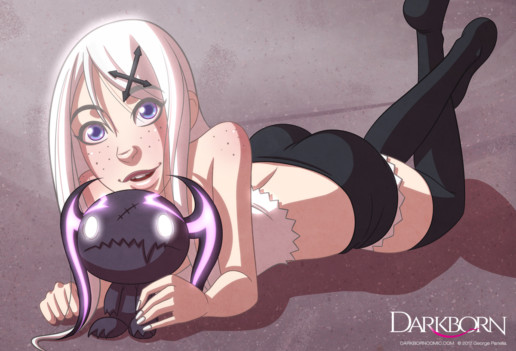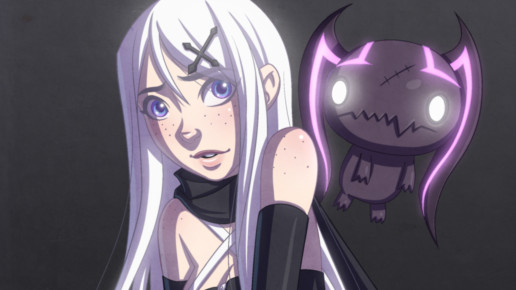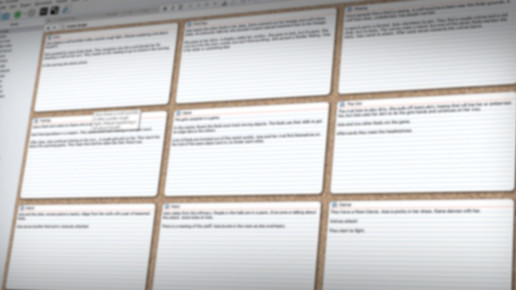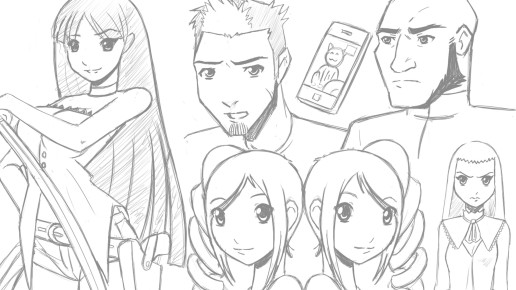A Year After
So it's been a little over a year since I started Darkborn. I've been so busy that I haven't been able to post anything here. I can't believe it's been a year already. Those that may have been following might have noticed a lack of updates to Darkborn in the last couple of weeks. I wanted to make a little post explaining why that is and what the plan is from here on out.
One of the reasons it took me so long to even get Darkborn going in the first place was that I really wanted to plan the story out. My previous webcomics really lacked in that department. Due to an extended bout of procrastination (shakes fist at MMORPGs) it took me about a decade to really get going. The drive was never gone, it's just -really- hard to get yourself to work on something when all you want to do is draw... or play a game. Planning isn't that fun. Despite all that, and many dead-end ideas in-between, I finally got to a point with Darkborn I was happy with.
When Darkborn launched I was really proud and happy to finally have an ongoing project again. However, several months in I started to notice a few issues and there was this nagging bit of doubt growing in the back of my head. I kept producing a page each week hoping I'd get over the hump or figure something out.
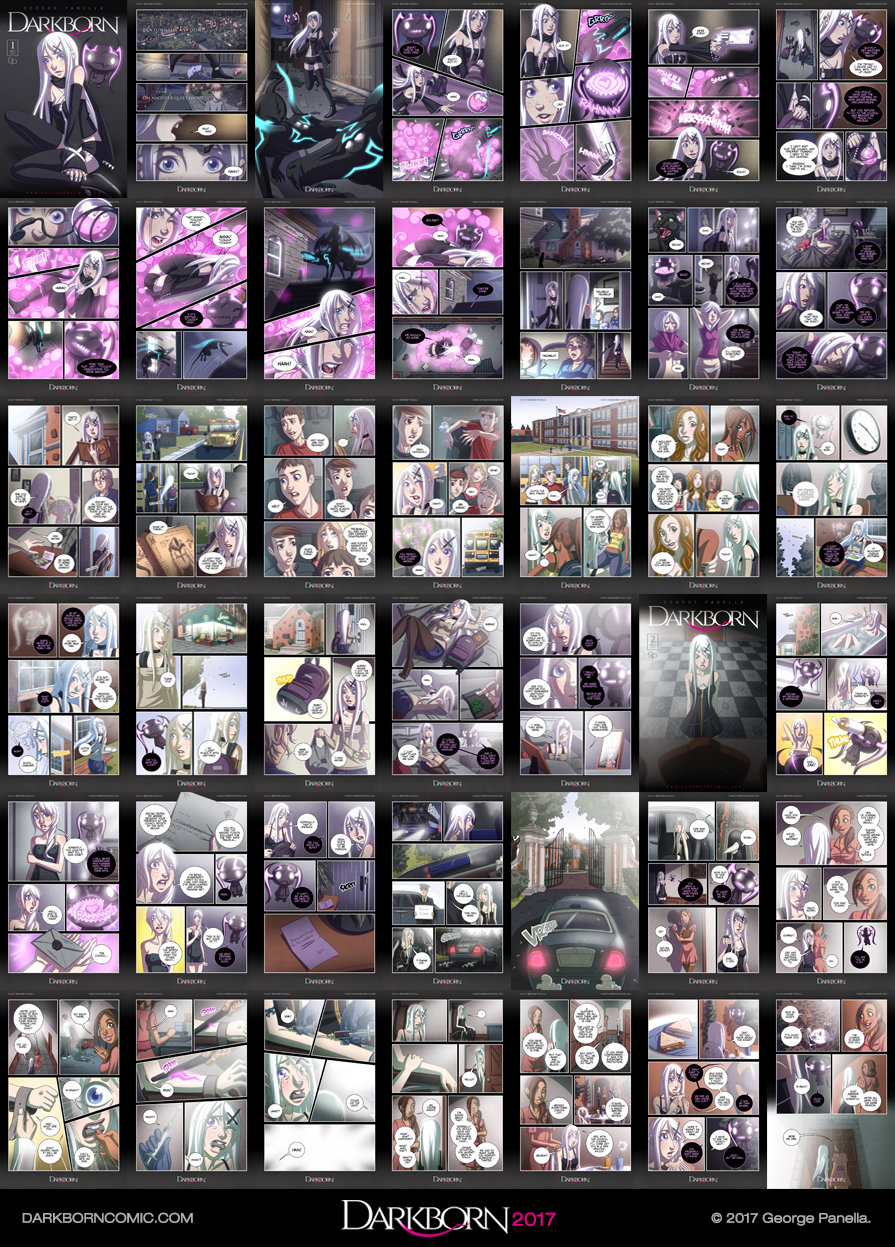
At this point, though, I feel that some facts have come to light.
- First thing I realized was that the story was moving very slowly. I may have taken the "show don't tell" mantra too literally. In my attempt to provide information about the world of Darkborn I ended up jumping all over the place to "show" these things. I also really didn't want to show too many of the "secrets" too soon. But I think this caused me to drag the story out too much in some ways. With a weekly update this was just too slow.
- I feel that Azia's primary goal of searching for her parents was too much of a focus and not really a great hook in the end. A big portion of the story was based on this and I feel that it just made things drag on. It wasn't really interesting.
- The really big one for me was the format itself. I started to become really frustrated with trying to convey these scenes I had in my mind in still frames. To me I saw things a lot differently in my head than I was able to put to the page. I think in time that caused me to get a little bored and frustrated. It also didn't help the slowness of the story as I would try to add more frames to show what was going on, sometimes with very little text.
- Finally the time involved. A page could take me twenty hours (give or take). That's basically a part time job. Any other projects I wanted to work on had to take a backseat. It was becoming rather draining.
With a weekly update all these things just made the story seem to crawl and if I'm honest, I think the lack of readership showed that. If I could create more than one page a week maybe it would have been better, but that's simply impossible. Now I don't want to sound like I'm whining due to hard work or anything. I enjoyed producing Darkborn, but I just felt the benefits weren't adding up. In this era of streaming video content, I think a webcomic is a hard "sell" as it is. Even I would rather just watch something online than read my own webcomic.
All that said, what is to become of Darkborn? Well, I feel it's best if I take a break. I've already started to work on other ideas. While I sort of burned out on Darkborn my drive to make stories hasn't gone away. If anything this was a good learning experience. I think for me I need to pursue the one thing that I always dreamed about and thats animation.
I've already invested in Moho and Lightwave 3D. I recently bought a few training series for animating characters (it's fifty hours long... @_@) I have several new ideas on the table and I have been testing out visual ideas.
There is a lot of planning, experimenting, and learning that I need to do. Maybe nothing will come of it and in another decade I'll be in the same spot, but I'm not going to give up.
I want to post my progress when I get to a point I feel I'm getting somewhere. So I hope that you continue to keep an eye out and see what comes about.
Till then, see you soon!
![]()
Darkborn
I started this blog several years ago because I was inspired to get back into creating stories and drawing. Ultimately, I wanted to create a new comic. As some of you may know, many moons ago I had two comics online, but when I finished them... I just stopped. I didn't start another one. A lot of that was due to life things and spending way too much time gaming, but the other issue was that I felt my last two attempts severely fell short due to poor story planning. I wanted my next comic story to be fully thought out and created properly. That, however, caused me to over-examine everything I came up with... so time dragged on and on. But, finally, many many years, ideas, games, and more life issues later, I think I finally managed to create a story I feel confident with, and I'm excited to get it started. It took a while, but some things can't be helped. It's not a work of art by any means, but it will hopefully be a fun little comic.
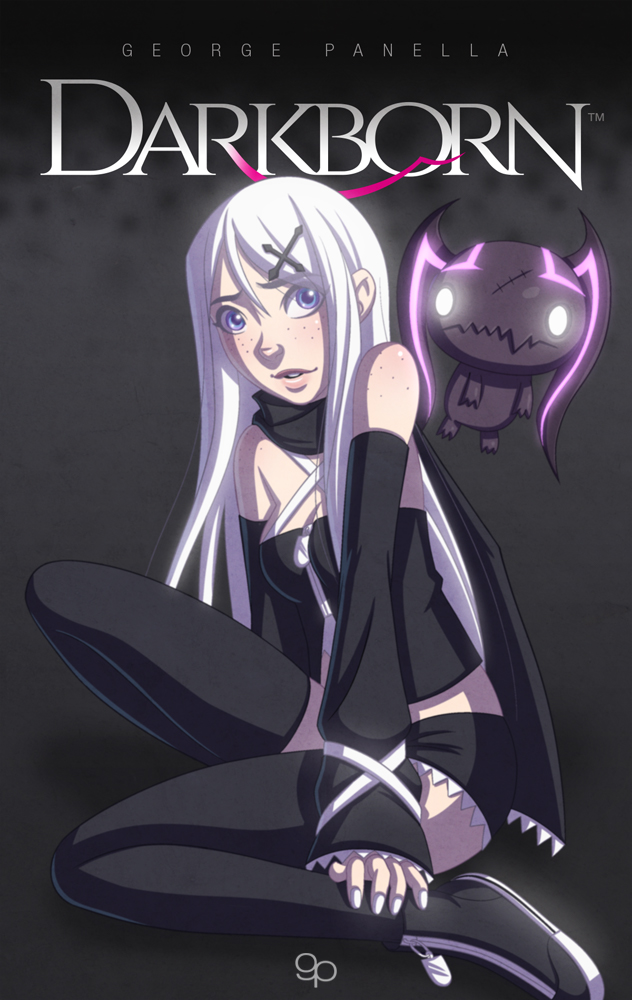
As the title states, the new comic is called Darkborn. It takes place in an average town and follows a teen girl named Azilina Cross. What most don't know is that she comes from a long lineage of monster hunters that are part of the mysterious Venatores Council. However, Azia's parents disappeared five years ago during one of their monster hunts. Azia didn't have much time to adjust before she was thrusted into a foster home. Azia's life was fairly dark for several years with her family familiar, Jax, as her only real friend. But she recently began to train to hunt monsters with the help of Jax. Through her training and hunting monsters Azia really hopes to find her parents... or at least learn what happened to them, which leads her on an adventure she never could have imagined. It's a dark world filled with monsters at every corner and it is the job of Hunters to find and kill them. Will Azia succeed and find her parents or will she become some monster's next meal?
The story took me a few months to plan, but much of it was based off older story ideas that I cobbled together to create this one. It quickly took on a life of its own. I plan to explain the process I used in more detail down the road, but I found that using a mind-mapping program really helped me to quickly plan the story out. From there I used Scrivener to start scripting the individual comic pages.
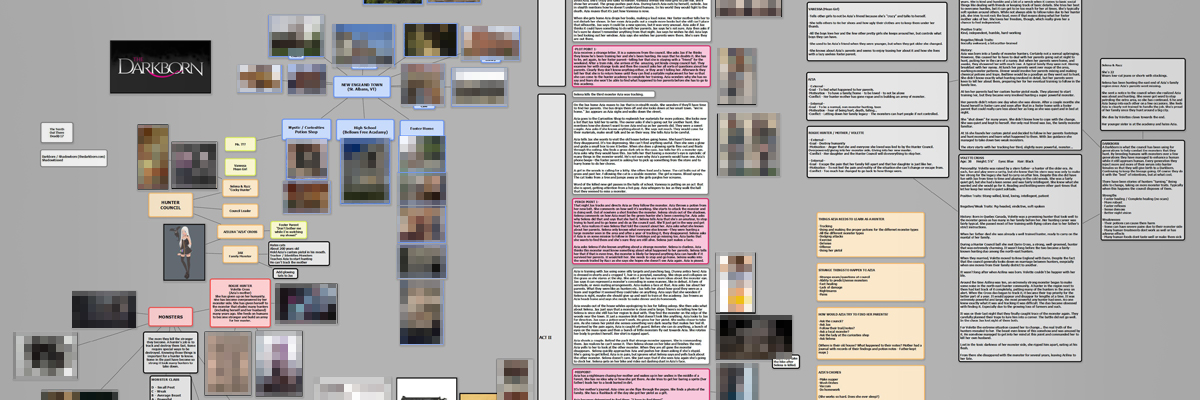
I'm currently working on the initial comic pages that will launch with the Darkborn website. Many are already sketched out and I'll be inking and coloring them soon. The website itself is mostly ready to go, it just needs some more polish and information about the comic.
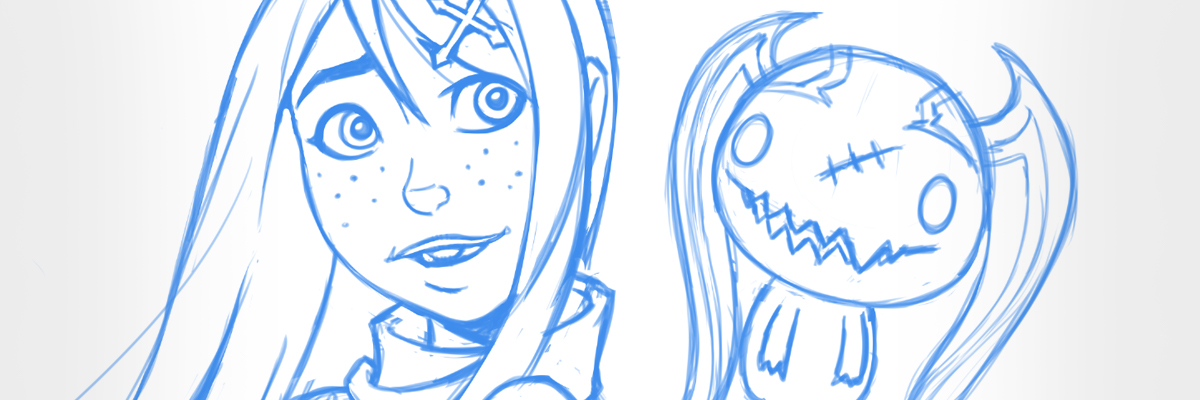
Things are coming together. The Darkborn website should launch in the coming weeks. I'll do my best to post updates on my tumblr and twitter, so please follow so you can keep up to date on its progress. I'll see you all then!
![]()
Creating Worlds
As I attempt to reenter the realm of story-making I've been trying to figure out ways to make the process easier and more manageable for myself. It's usually easy to come up with an idea, but to take that idea and make it something that has a beginning, middle and end with compelling situations and characters can be a whole different animal.
I'm no expert on this, not even close. My track record is anything but mediocre at best. However, creating stories, characters, and worlds has been an activity that I've enjoyed doing since I was a kid. I'm currently trying to develop stories for two potential personal projects. I had little problem coming up with the general ideas for both. In fact, I have several ideas that I like, many were started years before. The first problem was to narrow them down. In the end I decided on two ideas that seem interesting and fun and are also something that I think I can handle. I was even able to combine a couple ideas together to make them more layered.
I have plans for both of these ideas, but that's not what I want to talk about here. I want to give some tips I've come up with to help me develop these ideas into full stories. So if, like me, you have your idea(s), you can picture it in your head, but it's not a complete story, what next?
Characters
The most important thing for a story is to have compelling characters, so this is likely the next best place to start. We need to figure out whom or what will move the story forward. Who is the good guy and who or what will try to stop them? We need conflict. You've likely heard the phase man versus man, man versus himself, and man versus nature. These are the bases for story conflict. It doesn't always have to be another person that's causing the problem, so keep that in mind.
Usually when you have a story idea in mind you will know, vaguely, who the characters will be, but they aren't usually very fleshed out. We'll work on that in later steps. The main thing is to have in mind who the characters are in the story. Don't be afraid to add more characters or remove some and never be afraid to kill off a character if it will move the idea forward.
Also keep in mind relationships between the characters. Do they get along? Are they related? These things can be useful in developing more story ideas.
Scenes
The next thing is to try and drum up as many scene ideas as we can. Knowing the characters and the overall story idea we should be able to think of some interesting scenes that we'd like to have in our story. Order is not important here. What we want to do is basically create a catalog of ideas. Don't worry about how much they make sense. You might not use them in the end or you may merge some later on.
The trick here, and for any story development, is to keep asking "what if?" What if the character runs away? What if they have an unknown brother? What if they get hit by a car? These kind of questions can easily spark scene ideas.
One of the most crucial scenes we need to think of here is the ending. This is something that may take a long time to develop. It is, after all, the crux of the whole story. We don't even need to know how it happens yet, we just need to have an ending. If unsure, you can try to think of a couple endings. If you can't come up with an ending then the next phase will likely help.
Work on both of these parts for a while. Let the ideas "cook" in your head. Give it a couple days or even weeks, each day try to add more ideas. When you get to a point that you just can't come up with more ideas, move on to the next part.
Research
At this point we need some fresh ideas. It also doesn't hurt to see how other stories are setup. We should find some inspiration to get ideas. I'm not talking about stealing ideas here. That's never a good idea. Get it? Ahem... Anyway, we can learn a lot from other sources and it will likely spark more ideas. Look at books, comics, and movies etc. It's likely that your original story idea was sparked from something you read or saw. Try to find stories that have elements similar to your idea. It doesn't even have to be the same genre. We're looking mainly for character development. What has a character in it in a situation similar to your character?
I like to watch TV shows and movies. This way I can see and more easily feel the character's emotion. It's also faster than reading a novel. Yes, I'm lazy. The point is to, again, gather as many ideas as we can. I usually will write down little things anything to spark more "what if" questions. For example: I saw a fight scene where someone got thrown out the window. I had no idea if I could use that, but it was an exciting and scary moment in the show, so I wrote it down.
I don't just jot down scene ideas, I'll also pick out character traits—"Likes animals" "Hates smoke" "Is afraid of heights." I can use these to help flesh out my characters.
Again spend a couple days or weeks on this part of the process. I keep adding all these things to my "idea list" on my iPad. That way they are in one place an I don't have to worry about losing papers etc.
Once you have collected a decent amount of fresh ideas, go to the next step.
Chapters
With all our ideas gathered it's time to test ourselves. We came up with as many ideas as we could and we did research. Let's see how far we've come. At this point we should create a list. I will usually start with a numbered list of, say, 10 or 12 chapters and then test myself to see how many chapters I can fill in. I figure that the first two chapters are the introductions, where we learn about the character(s) and are met with the first challenge that sets the stage for the rest of the story. Then I go to the bottom of the list and put the ending. Then I'll fill in a couple chapters before the ending. These are the lead-in chapters, the build up to the final conflict.
With that in place I'll have a few chapters left over to fill in. Here is where all those ideas come into play. We can start to figure out where some of those idea can play into the overall story. Can some of them lead into other ideas? Can we make connections between scene ideas? Do we need a new character to move things along?
If we can't fill in all those chapters then we need to go back and find more ideas or try to combine some of the ones we have. You can repeat this process until you have all the chapters filled in. The ideal situation is to have more ideas than chapters slots on the list. You don't want to add too many unneeded chapters. Going from 10 chapters to 100 is likely not a good sign. You should always make sure that each chapter and each scene moves the story forward. If it doesn't, and it's just fluff, then you should remove it or merge it with a scene that does move things forward.
By this point we should have a decent idea of what's going on in our story. We should have a very basic outline. From here we need to refine and add detail.
The basic process here overall is to start with very broad strokes and then slowly narrow things down to the details. This way we never get overwhelmed with the details from the start. We work towards that slowly so that we can always see the whole picture. This is actually true for drawing too.
If you get stuck then either something is preventing the story from taking shape or, more likely, there is an idea that's blocking other ideas from connecting. Something else you can try is to take all the ideas you gathered place them on index cards and try to jumble them around to see what ideas crop up. Place a couple cards in random order and see what you get. You may be surprised. It's all about sparking an idea.
And finally, talk to others. By talking to friends and family about your ideas you may find that ideas just jump out at you in the process of explaining it. Or they may ask you a question that forces you to think of an answer. If the idea sounds bad while you explain it, it's likely that you'll need to keep working on it.
Always write down ideas. Don't let them slip your mind. An iPad is great for that "nighttime idea" that you think of as you are trying to fall asleep. Just be sure the glowing screen doesn't bother others.
Of course, there are many other ways to develop a story. This is just a method that seems to work for me.
![]()
Story Development
Today I want to talk about developing a story. During the process to create my next webcomic the biggest hurdle for me has been story development. For many months I've been stuck on the story, going through many ideas. I had a basic setting in mind and most of the primary characters were already created, I just needed a story.
My last couple of comics were weakest in the story department (among, probably, many other things). I was rushed to get them started and just went with the first thing that came to mind. This has proven to be a major oversight. It got to the point that I was developing the story page by page each week. This created a complete lack of consistency and plot development. Half the time "I" didn't even know where the story was going.
This time, however, I wanted to really plan things out and do it properly. But what started as, what was supposed to be, a simple and fun little story turned into a self-made trap. I became overly critical and for many months got stuck on the small details, keeping me from moving forward. New games didn't help me either. It's good to want to do something well and the "right way," but when it causes you to become overly-critical of the details you can lose the bigger picture and you won't be doing yourself any favors. You may become frustrated and give up.
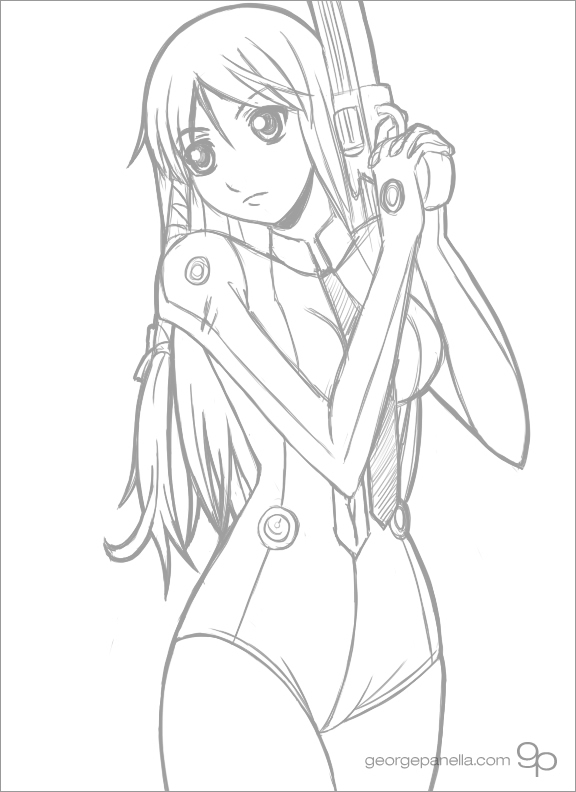 Personally, I love to create characters. A lot of my ideas come from my sketches alone. I may have one thing in mind, but something else appears in a doodle that sparks a new idea. However, this can only get me so far. Eventually I need to sit down and actually plan out the whole thing.
Personally, I love to create characters. A lot of my ideas come from my sketches alone. I may have one thing in mind, but something else appears in a doodle that sparks a new idea. However, this can only get me so far. Eventually I need to sit down and actually plan out the whole thing.
So with a new year and the realization I wasn't making progress, I started to work on it again, but this time I tried a different approach. I took a step back and tried to look at the overall picture. I had a beginning in mind, something that I usually have an easy time with, but I needed an ending. So instead of trying to think really big for some grand ending, I tried to think smaller.
Taking the beginning that I had previously created, instead of starting over, I tried to think how the characters could have reached that point. What caused this event to begin? I erased some previous reasons and twisted things around. Whenever I ran into a dead-end I tried adding a new character to help move things forward. Characters or situations that try to stop a character from his/her goals is the core basis for a story plot. You need a character or event to start the "domino effect," so to speak. Figuring out why that happened and how to change it or stop it can help you develop an ending. Before I knew it, by thinking of what triggered my beginning, I had a plot that could lead me to an ending.
This is a good way to come up with ideas for just about anything. Something as simple as adding a new element to the mix or looking at all your elements from other angles can surprise you with new ideas. Even just sketching on paper can help. I've been able to add small details to my story due to random sketches. Say, I draw a watch on a character -- then I might think about how the character got that watch and is there a story behind it.
Once there is a beginning and ending in mind you can move to filling in the details and add events that happen in the middle. To break things down into managable chunks, I started thinking of story ideas in terms of "episodes". Another thing you can do is put ideas on index cards. To make things simple I planned for a 13 "episode" "season." With that in mind I just started to jot down random ideas for "episodes." I didn't limit myself at first, I just wrote down any idea that came to me. I continued this process for a couple days until I had a nice list. If it's easier for you to think in chapters, episode, or use index cards then do so. Any method that helps you organize your thoughts is a step forward. The worst thing you can do is stifle your progress by trying to do things a certain way.
From my list not all ideas stood out, so I started to pick my favorite ones and then arrange them in an order that seemed to make sense. Like I said before, this method works as well with index cards. You can write an idea for an "episode" or chapter on a card and then when you have several you can move them around and see how they might connect. New ideas might spark from the arrangement alone. An idea for one might be combined with another to make an even more interesting idea. I'm going to keep my old ideas as well. You should never throw out an idea. Keep it for later or for another story. You never know when it can come in handy.
From here you can think about an overall story flow keeping in mind things like "Introduction," "Transition," "Turn," and "Conclusion." This is the Chinese method of making stories and poetry, Ki-Sho-Ten-Ketsu. You could also think of it as "Introduction," "Development," "Climax," and "Conclusion." For my story, that will span several "episodes," I needed to think of a flow for each "episode" and one for the overall story that leads to the ending. So when arranging my individual story ideas (episodes) I placed the ideas that seemed more introduction-based towards the beginning and ones that could be a climax that could lead into the ending towards the end of the list.
These are just the very basic steps I've taken to help me develop my story. There are many ways to go about it and there are other things to consider such as character personalities and desires, the world/setting and its rules, subplots, and many more. Don't let yourself get too bogged down in the details or methods. That can be a quick path to idea-block. And always be on the look out for ideas from any location like books, sketches, TV, news, and music etc.
As I begin to narrow down my story I'm slowly gaining focus on the characters in it. Like I said before, just from sketching random ideas can crop up.
Have you ever created a story? What methods helped you develop it? What did you feel worked and didn't work?
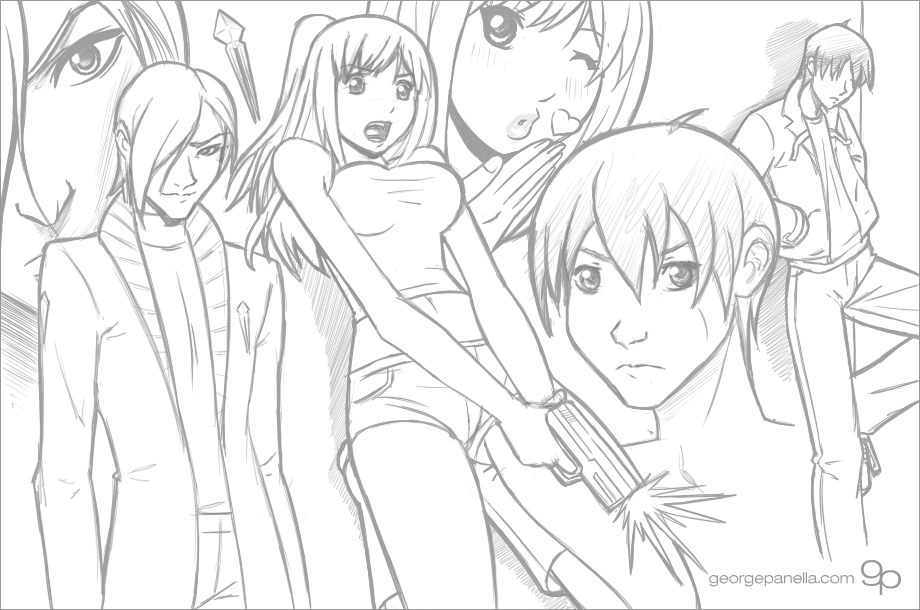
![]()

